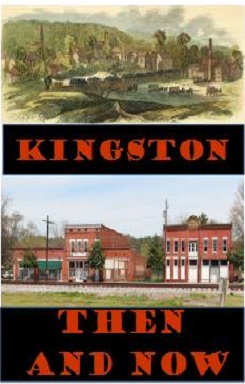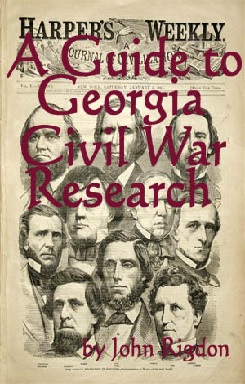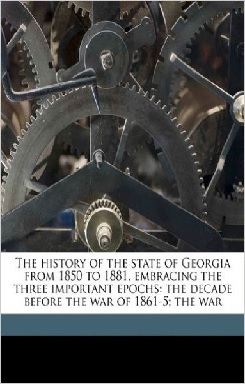The Real "Bill Arp"
Bill Arp who Charles Smith immortalized in his newspaper columns was a real citizen of this area. His name was actually William Earp. He served in the GA 18th Infantry Regiment,Company F. His son, Andrew of the same unit was killed at Fredericksurg.
In is book, The Uncivil War to Date, Charles Smith gives a delightful picture of the real "Bill Arp."
He was a small, sinewy man, weighing about one hundred and thirty pounds, as active as a cat, and always presenting a bright and cheerful face. He had an amiable disposition, a generous heart, and was as brave a man as nature ever makes.
He was an humble man and unlettered in books; never went to school but a month or two in his life, and could neither read nor write; but still he had more than his share of common sense; more than his share of good mother wit, and was always welcome when he came about.
Lawyers and doctors and editors, and such gentlemen of leisure who used to, in the olden time, sit around and chat and have a good time, always said, "Come in, Bill, and take a seat;" and Bill seemed grateful for the compliment, and with a conscious humility squatted on about half the chair and waited for questions. The bearing of the man was one of reverence for his superiors and thankfulness for their notice.
Bill Arp was a contented man--contented with his humble lot. He never grumbled or complained at anything; he had desires and ambition, but it did not trouble him. He kept a ferry for a wealthy gentleman who lived a few miles above town on the Etowah river, and he cultivated a small portion of his land; but the ferry was not of much consequence, and when Bill could slip off to town and hear the lawyers talk he would turn over the boat and the poles to his wife or his children and go. I have known him to take a back seat in the courthouse for a day at a time, and with face all greedy for entertainment listen to the learned speeches of the lawyers and charge of the court, and go home happy and be able to tell to his admiring family what had transpired. He had the greatest reverence for Colonel Johnson, his landlord, and always said that he would about as leave belong to him as to be free; "for," said he, "Mrs. Johnson throws away enough old clothes and second-hand vittels to support my children, and they are always nigh enough to pick 'em up."
Bill Arp lived in Chulio district; we had eleven districts in the county, and they had all such names as Pop-skull, and Blue-gizzard, and Wolf-skin, and Shake-rag, and Wild-cat, and Possum-trot, but Bill lived and reigned in Chulio. Every district had its best man in those days, and Bill was the best man in Chulio. He could out-run, out-jump, out-swim, out-rastle, out-ride, out-shoot anybody, and was so far ahead that everybody else had given it up, and Bill reigned supreme. He put on no airs about this, and his nabors were all his friends. [NOTE: Chulio district was between Kingston and Rome, south of the Etowah. Bill may have operated the Freeman Ferry.]
But there was another district adjoining, and it had its best man, too. One Ben McGinnis ruled the boys of that beat, and after awhile it began to be whispered around that Ben wasn't satisfied with his limited territory, but would like to have a small tackle with Bill Arp. Ben was a pretentious man. He weighed about 165 pounds, and was considered a regular bruiser. When Ben hit a man he meant business, and his adversary was hurt--badly hurt, and Ben was glad of it. But when Bill Arp hit a man he was sorry for him, and if he knocked him down he would rather help him up and brush the dirt off his clothes than swell around in triumph. The quicker a man whips a fight the less of it he has to do, and both Ben and Bill had settled their standing most effectually. Bill was satisfied with his honors, but Ben was not, for there was many a Ransy Sniffle who lived along the line between the districts, and carried news from the one to the other, and made up the coloring, and soon it was narrated around that Ben and Bill had to meet and settle it.
The court-grounds of that day consisted of a little log shanty and a shelf. The shanty had a dirt floor and a puncheon seat, and a slab for the 'Squire's docket, and the shelf was outside for the whiskey.
The whiskey was kept in a gallon jug, and that held just about enough for the day's business. Most every body took a dram in those days, but very few took too much, unless, indeed, a dram was too much. Pistols were unknown, and bowie-knives and brass-knuckles and sling-shots and all other devices that gave one man an artful advantage over another.
When Colonel Johnson, who was Bill Arp's landlord, and Major Ayer and myself got to Chulio, Bill Arp was there, and was pleasantly howdying with his nabors, when suddenly we discovered Ben McGinnis arriving upon the ground. He hitched his horse to a swinging limb and dismounted and began trampoosing around, and every little crowd he got to, he would lean forward in an insolent manner and say, "Anybody here got anything agin Ben McGinnis? If they have, I goll, I'll give 'em five dollars to hit that; I golly, I dare anybody to hit that," and he would point to his forehead with an air of insolent defiance.
Bill Arp was standing by us and I thought he looked a little more serious than I ever had seen him. Frank Ayer says to him, "Bill, I see that Ben is coming around here to pick a fight with you, and I want to say that you have got no cause of quarrel with him, and if he comes, do you just let him come and go, that' all." Colonel Johnson says, "Bill, he is too big for you, and your own beat knows you, and you haven't done anything against Ben, and so I advise you to let him pass; do you hear me?"
By this time Bill's nervous system was all in a quiver. His face had an air of rigid determination, and he replied humbly, but firmly, "Colonel Johnson I love you, and I respect you, too; but if Ben McGinnis comes up here outen his beat, and into my beat, and me not having done nothing agin him, and he dares me to hit him, I'm going to hit him, if it is the last lick I ever strike. I'm no phist puppy dog, sir, that he should come out of his deestrict to bully me."
I've seen Bill Arp in battle, and he was a hero. I've seen him when shot and shell rained around him, and he was cool and calm, and the same old smile was upon his features, but I never saw him as intensely excited as he was that moment when Ben McGinnis approached us, and, addressing himself to Bill Arp, said, "I golly, I dare anybody to hit that."
As Ben straightened up, Bill let fly with his hard, bony fist right in his left eye, and followed it up with another so quick that the two blows seemed as one. I don't know how it was, and never will know; but in less than a second, Bill had him down and was on him, and his fists and his elbows and his knees seemed all at work. He afterwards said that his knees worked on Ben's bread basket, which he knew was his weakest part. Ben hollered "enough" in due time, which was considered honorable to do when a feller had enough, and Bill helped him up and brushed the dirt off his clothes, and said, "Now, Ben, is it all over betwixt us, is you and me all right?" And Ben, said, "It's all right 'twixt you and me, Bill; and you are much of a gentleman." Bill invited all hands up to the shelf, and they took a drink, and he and Ben were friends.
This is enough of Bill Arp--the original, the simon-pure. He was a good soldier in war. He was the wit and the wag of the camp-fires, and made a homesick youth laugh away his melancholy. He was a good citizen in peace. When told that his son was killed he looked no surprise, but simply said: "Major, did he die all right?" When assured that he did, Bill wiped away a falling tear and said, "I only wanted to tell his mother."




